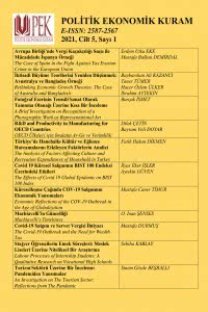Bir Girişimci “Burjuva” Olarak “Bay Peachum” ya da Sombart vs. Brecht
İktisadi düşünce tarihi içinde pek de iyi olmayan bir akademik ve kişisel şöhrete sahip olan Sombart ile epik tiyatronun öncüsü sayılan Brecht’in burjuva/girişimciyi ele alış biçimleri açısından karşılaştırma amacında olan bu çalışmada her iki yazarın bu kapsamda temel metni olarak değerlendirilebilecek Burjuva ve Beş Paralık Roman’daki burjuva/girişimci anlatıları derlenerek aralarındaki benzerlik ve farklılıklar üzerinde durulmuştur. Sombart, kapitalizme yol açan yeni bir insan tipi olarak burjuvanın sahip olduğu niteliklerin tarihsel seyrini iki dönem şeklinde resmederken; Brecht, savaş sonrası dönemin burjuva/girişimcisi ve gerçekte kapitalizmine yönelik bir başka hikâye anlatır. Her iki eserin incelemesi sonucunda iki anlatı arasındaki temel farklılığın Sombart’ın kapitalizmin ileri aşamalarına ait olduğunu söylediği ve erken dönem burjuvasına özgü nitelikler ile kıyaslandığında negatif anlamlar yüklediği niteliklerin Brecht’te tüm dönemler için geçerli olan ve kapitalist girişimcinin gerçek doğasını yansıtır şeklinde ele alındığı söylenebilir.
Anahtar Kelimeler:
Werner Sombart, Bertolt Brecht, Burjuva
“Mr. Peachum” as a “Bourgeois” Entreprenuer or Sombart vs. Brecht
In this study, Sombart who has an academic and personal bad reputation in history of economic thought and Brecht who is considered as the pioneer of epic theatre are compared in terms of the way they deal with the bourgeois/entrepreneur. Bourgeois/entrepreneur narratives of both authors in their main texts, The Bourgeois and Die Dreigroschenroman have been compiled and the similarities and differences between them are emphasized. While Sombart depicts the historical course of the characteristics of the bourgeois as a new human type that leads to capitalism, in two periods; Brecht tells another story about the bourgeois/entrepreneur and indeed capitalism of the post-war period. As a result of the analysis of both works, it can be said that the main difference between the two narratives is that the qualities that Sombart says belong to the advanced stages of capitalism and that he attributes negative meanings when compared to the qualities peculiar to the early bourgeoisie are considered in Brecht as valid for all periods and reflecting the true nature of the capitalist entrepreneur.
Keywords:
Werner Sombart, Bertolt Brecht, Bourgeois,
___
- Brecht, B. (1998). Üç Kuruşluk Opera, Çev. Y. Erten, İstanbul: Mitos Boyut Yayınları.
- Brecht, B. (2011). Beş Paralık Roman, Çev. S. Soysal, İstanbul: İletişim Yayınları.
- Defoe, D. (1997). Robinson Crusoe, Çev. A. Göktürk, İstanbul: YKY.
- Hikmet, N. (1987). Memleketimden İnsan Manzaraları, Ankara: Bilgi Yayınevi.
- Kuczynski, J. (1968). Werner Sombart, in International Encyclopedia of the Social Sciences Vol.15; Ed., David L. Sills, The Macmillian Company& The Free Press: USA, pp. 57-59.
- Moretti, F. (2005). Mucizevi Göstergeler. Edebi Biçimlerin Sosyolojisi Üzerine, Çev. Z. Altok, İstanbul: Metis Yayınları.
- Moretti, F. (2015). Burjuva. Tarih ile Edebiyat Arasında, Çev. E. Buğlalılar. İstanbul: İletişim Yayınları.
- Pamuk, O. (2023). Cevdet Bey ve Oğulları, 14. Baskı, YKY: İstanbul.
- Sert, M. (2021a). Sombart in the Turkish Mirror: A Case of Sabri F. Ülgener. Fiscaoeconomia, 5(1), 38-55.
- Sert, M. (2021b). Sombart ve Kadro ‘Yeniden’. Mülkiye Dergisi, 45(3), 667-697.
- Shakespeare, W. (2014). Atinalı Timon, Çev. S. Eyüboğlu, 4. Baskı, İstanbul: İş Bankası Yayınları.
- Sombart, W. (1913a). Luxus und Kapitalismus, Duncker&Humblot: München und Leipzig.
- Sombart, W. (1913b). Krieg und Kapitalismus, Duncker&Humblot: München und Leipzig.
- Sombart, W. (1915). The Quintessence of Capitalism: A Study of the History and Psychology of the Modern Business Man, Trans. M. Epstein, E.P. Dutton &Company: New York.
- Sombart, W. (2011). Burjuva: Modern Ekonomi Dönemine Ait İnsanın Ahlaki ve Entelektüel Tarihine Katkı, Çev. O. Adanır, 2. Baskı, Ankara: Doğu Batı Yayınları.
- Sombart, W. (2013). Aşk, Lüks ve Kapitalizm: Modern Dünyanın Savurganlığın Ruhundan Doğması Üzerine, Çev. N. Aça, Ankara: Pharmakon Yayınları.
- Sombart, W. (2019). Modern Capitalism Vol 1: The Pre-Capitalist Economy, K A Nitz: Albany, New Zeland.
- Sutton, F. (1948). The Social and Economic Philosophy of Werner Sombart: The Sociology of Capitalism, in An Introduction to the History of Sociology; Ed., H. Banes, Chicago University Press: Chicago, pp. 316-331.
- Tanpınar, A.H. (2017). Saatleri Ayarlama Enstitüsü, İstanbul: Dergâh Yayınları.
- Vom Brocke, Bernhard (1996). Werner Sombart 1863-1941 Capitalism-Socialism His Life, Works and Influence, in Werner Sombart (1863-1941) Social Scientist Vol.1: His Life and Work, Ed. J. Backhaus, Metropolis: Marburg, pp. 19-102.
- Wallerstein, I. (1988). The Bourgeois(ie) ad Concept and Reality, New Left Review, I(167), 91-106.
- Weber, M. (2002). Protestan Ahlakı ve Kapitalizmin Ruhu, Çev. Z. Gürata, 3. Baskı, Ankara: Ayraç Yayınevi.
- White, H. (1986). Tropics of Discourse: Essays in Cultural Criticism, Johns Hopkins University Press: Baltimore.
- Wood, E.M. (2007). Kapitalizmin Arkaik Kültürü, Çev. O. Köymen. İstanbul: Yordam Kitap.
- Yayın Aralığı: Yılda 4 Sayı
- Başlangıç: 2017
- Yayıncı: Ahmet Arif EREN
Sayıdaki Diğer Makaleler
Terörizmle Mücadele Eden Vijilanti Grupların Dönüşümü: Nijerya ve Güney Sudan Örnekleri
Parlamenterler Bürokratları Nasıl Anıyor? TBMM’nin 27. Yasama Dönemi Üzerine Bir İçerik Analizi
Sıfır Atık Yönetimi Etkinliğinin Veri Zarflama Analizi ile Değerlendirilmesi: Büyükşehirler Örneği
Bilal SARAÇ, Hakan Gökhan GÜNDOĞDU, Ahmet AYTEKİN
Çin Emperyalizminin Denizaşırı Kapitalist Adaları: Özel Ekonomik Bölgeler
Küresel İnovasyon Endeksi-İşsizlik İlişkisi: Panel GMM Analizinden Bulgular
Post Factum: Transnasyonel Kapitalist Sınıf Üzerine
Bir Girişimci “Burjuva” Olarak “Bay Peachum” ya da Sombart vs. Brecht
Tiftiğin Ankara’dan Silinişi (1880-1920)
John Maynard Keynes’in İstihdam Faiz ve Paranın Genel Teorisi’nin Türkçe Serüveni
